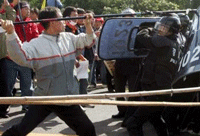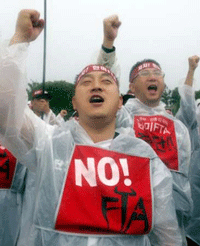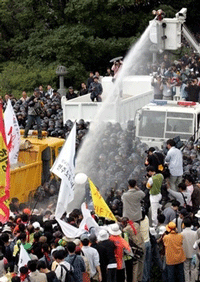Militant protests greet Korea-US FTA negotiations
Party for Socialism and Liberation
Militant protests greet Korea-U.S. FTA negotiations
Friday, October 27, 2006
By: Sarah Sloan
Remote location fails to deter workers, farmers
Militant protests have taken place daily during the fourth round of negotiations for the Korea-U.S. Free Trade Agreement. The negotiations are happening from Oct. 23-27 in Jeju, South Korea.

Plans to negotiate the KORUS FTA—a bilateral FTA between the United States and South Korea—were announced last February. Demonstrations have taken police outside each round of negotiations—Washington, D.C. in June, Seoul in July and Seattle in September.
The U.S. government has talked about making the KORUS FTA the "gold standard" of FTAs. The code word for its real intentions is "comprehensive," meaning there will be no exceptions. The U.S. government hopes that the FTA will tear down any existing barriers to U.S. economic domination of the South Korean economy.
FTA negotiations have encompassed the agricultural, manufacturing, textile, commercial, service and other economic sectors. The reach of the FTA would even impact the gambling industry, TV networks, postal delivery, telecommunications, patents and copyrights, and more. It would lead to the privatization of public services, including education.
If completed, KORUS FTA would be Washington’s largest free trade agreement since NAFTA. And its impact on workers and farmers in the United States and South Korea would be the same as NAFTA’s impact on workers and farmers in Mexico, the United States and Canada.
Majority opposition in South Korea
Opposition to the KORUS FTA in South Korea is vast. Even government polls show a majority opposing it.
The Korean Alliance Against Korea-U.S. FTA (KoA) is a coalition of 280 South Korean organizations that have joined together to organize opposition. When the second round of negotiations took place in Seoul in July, over 100,000 workers, peasants and others marched in torrential rains.
For the current fourth round of negotiations, the South Korean government moved the negotiations to the remote island of Jeju—60 miles from the southern tip of the Korean peninsula.
Jeju is often called a "resort" island because of the large number of beaches, golf courses and hotels that cater to tourists. It is also the home of many tangerine farmers.
The governor and provincial council of Jeju demanded that the location of negotiations be moved because of the negative impact that the FTA would have on the local economy.

Right now, South Korea imposes a 50 percent tariff on U.S. oranges. The United States wants the FTA to force South Korea to eliminate the tariff, which would mean a flood of cheap U.S. oranges. The influx of oranges would undercut South Korean farmers who grow oranges and tangerines.
Last month, a representative of Jeju’s provincial council said, "According to some analysts, the FTA will cause over U.S.$2 billion in damages to Jeju industries, including tangerines, for a decade. To hold the FTA talks in Jeju is an attempt to ridicule residents of Jeju."
Kim Tae-hwan, governor of Jeju, said, "At present, no cities or provinces whose main industry is agriculture will host the South Korea-U.S. FTA negotiations. If the FTA covers tangerines—which are Jeju’s lifeblood—Jeju can make a request to the government for the changing of the talks’ host city."
Police violently attack protests
Despite the objections of the local government and farmers, the negotiations have begun at the luxurious Shilla Hotel.
To prepare for the protests, 10,000 police from the mainland, along with over 500 vehicles and two helicopters, were dispatched to buttress the local Jeju police force of 2,000.

Protests began on Oct. 22, the day before the negotiations started. Thousands demonstrated in Seoul and others at Jeju’s airport. As the negotiations began on Oct. 23, local farmers and workers faced off against police.
Farmers, workers and activists from mainland South Korea have sought access to Jeju by boat and swimming. Maritime policemen have used patrol ships and rubber boats to attempt to stop fishing boats headed toward the island. Some boats carried protesters trying to reach the island. Other boats displayed banners and flags, a protest at sea that was visible from the negotiations’ site.
Riot police lined beaches to stop and detain protesters swimming to Jeju’s shores. They chased protesters who made it over the concrete barricades set up to keep them from entering the island.
On Oct. 23, over 10,000 protesters marched toward the negotiations’ site. They made it past a police line and got within half a mile of the hotel. Police continued to attempt to block their way and violently attacked demonstrators, injuring many, as they sprayed them with water cannons and beat them with shields and batons. Demonstrators fought back with bamboo and fishing poles.
Oh In-kyo, a 43-year-old farmer, was hospitalized and in a coma after he being beaten by police.
Some demonstrators attempted to access the hotel in a truck. Police had stacked large metal containers across a two-lane road in an attempt to block vehicular traffic. When the truck approached, police attacked, ramming their shields and batons through the windows and into the vehicle.
Protests to continue
Workers and farmers have continued to stage militant marches and rallies throughout the negotiations.
Actions have included burning tangerine trees and tangerines, symbolizing the fact that KORUS FTA will destroy the lives of farmers on Jeju Island; burning a coffin, symbolizing the death of the FTA; holding a torchlight march; carrying out the Sam Bo Il Bae march, a special type of Korean protest; and a march of civil servants and public sector workers.
Inside the negotiations, reports have indicated slow progress and many difficulties. The United States and South Korea have been unable to reach agreements on central issues. A U.S. Department of State report described the negotiations as "politically difficult."
The Korean Confederation of Trade Unions—a member of KoA—will be voting on beginning an indefinite strike to protest the KORUS FTA, along with domestic anti-worker measures, starting Nov. 15.
The fifth and final round of scheduled negotiations, set to take place in the United States in December, will again be met with militant protests.





